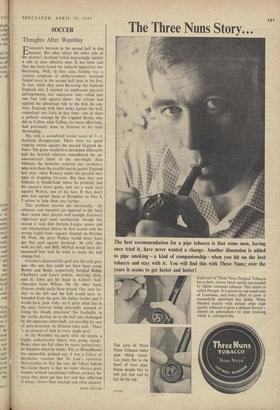SOCCER
Thoughts After Wembley
Eel"ENGLAND'S heroism in the second half in due honour. But what about the other side of the picture? Scotland failed depressingly against a side of nine effective men. It has been said that the Scots found the reduced opposition em- barrassing. Well, in that case, fouling was a curious symptom of embarrassment. Scotland fouled more in the second half than in the first. In fact, while they were harassing the depleted England side, I counted six unpleasant physical infringements, two successive ones rolled into one free kick against them: the referee had applied the advantage rule to the first. In con- trast, England, with their backs against the wall, committed two fouls in that time—one of them a pathetic attempt by the crippled Byrne, who did to Collins what Collins, far more effectively, had previously done to Greaves at his most threatening.
No, with a second-half corner score of 7-1, Scotland disappointed. There were no quick surprise moves against the massed England de- fence. The game would have developed differently had the Scottish selectors remembered the un- conventional talent of the neo-Anglo Alan Gilzean, the inventive surpriser par excellence, who won them the parallel match against England last year, when Ramsey made the parallel mis- take of dropping Greaves. But then they saw Gilzean at Sunderland, where he probably had his season's worst game, and not a week later against Wolves, one of his best. If they don't pick him against Spain at Hampden on May 8, I refuse to help them any further.
This problem worries me chronically : the selectors and reporters (as opposed to the fans) don't know their players well enough. Greaves's right-foot goal went unobserved, though this season it took him thirteen League games and one international before he first scored with his wrong (right) foot—against Arsenal on October 10. Now, the great Puskas would never have got that goal against Scotland: he only shot with his left, and Billy McNeil would have dis- possessed him had he tried to make the ball change feet.
Greaves's characteristic goal was the only pure one—the one that could not have been saved. Brown and Banks respectively bungled Bobby Charlton's and Law's remote, swerving shots, and St. John got his head to Cohen's half- clearance from Wilson. On the other hand, Greaves could easily have missed. One inch far- ther to the left and the ball would have re- • bounded from the post. Six inches farther and it would have gone wide—as it quite often has in the past, Greaves being invariably accused of losing his 'deadly precision.' No footballer in the world, darting on to the ball and challenged by the opposing centre-half, can possibly be sure of such precision. As Greaves once said: 'There is an element of luck- in every single goal.'
At the Wembley tea party after the match, a highly authoritative theory was going round: Banks does not fail when he reacts instinctively; he blunders when he thinks. Yet, as Blanchflower has meanwhile pointed out, it was a failure of instinctive reaction that let Law's optimistic thirty-yarder in. For the rest, the fallacy behind this facile theory is that we never discuss goal- keepers without exceptional reflexes anyhow, be- cause they never get that far; and that reflection is always slower than reaction and often unsurer.
11ANS KELLER






























 Previous page
Previous page